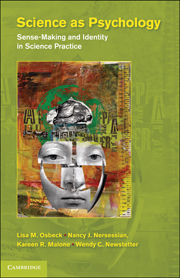Book contents
- Frontmatter
- Contents
- Acknowledgments
- 1 Introduction: Science and Persons
- 2 Methods of Study
- 3 The Problem-Solving Person
- 4 The Feeling Person
- 5 The Positioning Person
- 6 The Person Negotiating Cultural Identities
- 7 The Learning Person
- 8 Epilogue: Science as Psychology: A Tacit Tradition and Its Implications
- References
- Index
6 - The Person Negotiating Cultural Identities
Published online by Cambridge University Press: 05 July 2011
- Frontmatter
- Contents
- Acknowledgments
- 1 Introduction: Science and Persons
- 2 Methods of Study
- 3 The Problem-Solving Person
- 4 The Feeling Person
- 5 The Positioning Person
- 6 The Person Negotiating Cultural Identities
- 7 The Learning Person
- 8 Epilogue: Science as Psychology: A Tacit Tradition and Its Implications
- References
- Index
Summary
The discussion of race and gender is relevant to various subfields of traditional or mainstream social psychology: the psychology of women, the psychology of race (or “the psychology of ethnic minorities” as it is referenced by the American Psychological Association), and the psychological study of social issues. At the same time, the central themes and basic assumptions of this chapter are in keeping with the “second” social psychology, which focuses on analyzing the personal and cultural meanings revealed in real-time episodes of interaction (Harré & Moghaddam, 2003). The centrality of race and gender to both the “first” and “second” social psychologies reflects the status of these categories culturally. Gender and race are what Styker refers to as “master statuses” (cited in Deaux, Reid, Mizrahi, & Ethier, 1995). One is seldom, if ever, without race, particularly in a society with a history of explicit racism (Alcoff, 2006; Fanon, 1952/1967). Nor can one escape gender; the intimacy of such ascriptions to the person and their social salience cannot be denied. A person is always identified as raced and gendered and classified according to the criteria available within a culture. However, rationality and science are typically viewed as inattentive to these ascriptions; race and gender should not matter to science (Keller, 2001).
Yet if they are inescapable, race and gender are brought into the research laboratory in some way, however removed from cultural effects science traditionally is assumed to be.
- Type
- Chapter
- Information
- Science as PsychologySense-Making and Identity in Science Practice, pp. 157 - 194Publisher: Cambridge University PressPrint publication year: 2010

